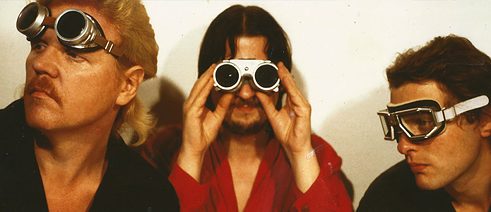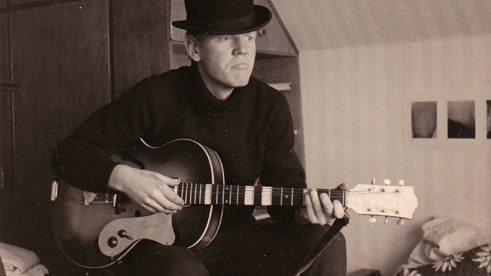MIFF 2017
Revolution of Sound: making music, making history

“This is rotten religious music!” Salvador Dali reportedly once yelled while Tangerine Dream played. It was the ‘60s, the surrealist painter was famous for his celebrity-filled garden parties, and the German synth-rockers had been invite to perform. Their psychedelic sounds sparked him out of his seat, inspired a few dance moves and incited the above exclamation, clearly hitting all of the right notes. Today, that name-dropping anecdote offers the perfect encapsulation of the band’s impact on the music scene — though they didn’t always receive such a strong, sudden response.
From those early instances of first sharing their inimitable stylings, to getting a kind note about the mind-altering properties of their ‘Zeit’ album from British DJ John Peel, to their recent collaboration with Queen’s Brian May, Revolution of Sound: Tangerine Dream documents it all. Compiling a combination of archival home video footage, concert clips, and old and new interviews, Margarete Kreuzer's documentary is as much a chronicle of a band creating the soundscape of the future from West Berlin as a tribute to their influence. Indeed, in striving to create their own distinctive sound, mastermind Edgar Froese and his array of cohorts didn’t just make music; they also made history.
Unconcerned with backstage dramas
Accordingly, traversing five decades’ of details in a largely linear fashion, Kreuzer steps through the who, what, when and where behind the group. Interesting details abound, whether surrounding their landmark use of a Moog synthesiser as a sequencer, or their foray into Hollywood. Comparisons to Pink Floyd arise, and band members come and go, though Revolution of Sound: Tangerine Dream is thoroughly unconcerned with backstage dramas. Instead, as it offers glimpses of live sets that demonstrate a commitment to not only sonic artistry, but to crafting an experience, it ponders how and why they struck a chord. The documentary about the German synth-rockers is a combination of archival home video footage, concert clips, and old and new interviews
| © Revolution of Sound: Tangerine Dream
That elusive question echoes as Froese’s insights intertwine with the music he created, serving up poetic gems such as “the entire world takes place in the head of a person” as a way of describing what he was aiming for. Narrated by the man himself before he passed away in 2015, it’s a query that has many offshoots. Why did their sound strike such a chord? Why did everyone from David Bowie, who would become friends with Froese during his Berlin years, to William Friedkin, who ask them to score his 1977 film Sorcerer, flock to their brand of electronica? Why did, as Dali recognised and as gigs controversially played in churches nodded to, their music feel like a transformative experience? And why did they come to revolutionise the sound of ‘80s cinema?
The documentary about the German synth-rockers is a combination of archival home video footage, concert clips, and old and new interviews
| © Revolution of Sound: Tangerine Dream
That elusive question echoes as Froese’s insights intertwine with the music he created, serving up poetic gems such as “the entire world takes place in the head of a person” as a way of describing what he was aiming for. Narrated by the man himself before he passed away in 2015, it’s a query that has many offshoots. Why did their sound strike such a chord? Why did everyone from David Bowie, who would become friends with Froese during his Berlin years, to William Friedkin, who ask them to score his 1977 film Sorcerer, flock to their brand of electronica? Why did, as Dali recognised and as gigs controversially played in churches nodded to, their music feel like a transformative experience? And why did they come to revolutionise the sound of ‘80s cinema?Many others provide their thoughts. In a recent chat, Michael Mann speaks of wanting the soundtrack to Thief to “float out there thematically”; in an earlier interview, Paul Brickman speaks of the mood he was looking for in ensuring Risky Business wasn’t just another teen film. Clips demonstrate the results in action, as well as the way they shaped and changed other features, and, later, even video games such as Grand Theft Auto V. Of course, as the latter snippets make plain, Revolution of Sound: Tangerine Dream is well aware that the answers to its contemplations an only come from the source. The group members themselves reflect upon their career and musical highlights; Froese’s voiceover delves into everything from the underlying quest for continuity and contrast to the importance of vibrations and frequencies; and, in a laudatory ode of a documentary, the corresponding soundscape speaks for itself.